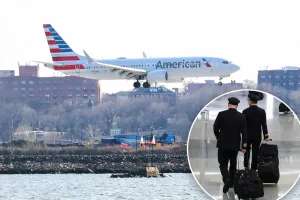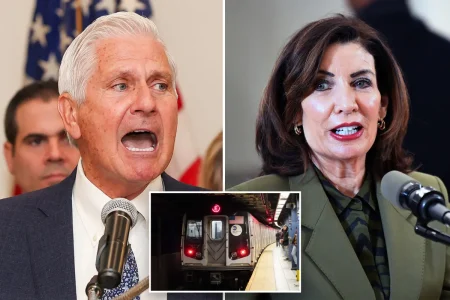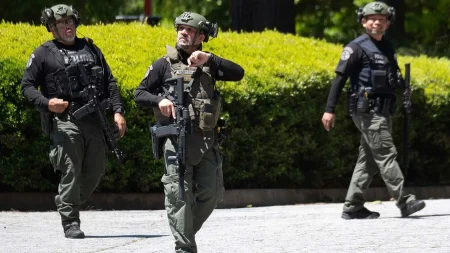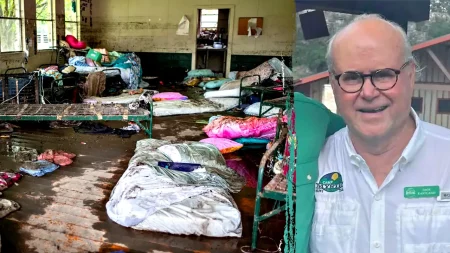Inside America’s Maritime Drug War: Scrutinizing the Confrontational Approach to Venezuelan Narcotics Trafficking
The Escalating Conflict on the High Seas: Trump Administration’s Aggressive Anti-Drug Strategy
The waters between South America and the United States have become an increasingly contested battleground in America’s decades-long war on drugs. In recent months, the Trump administration has dramatically intensified its approach to combating maritime narcotics trafficking, particularly focusing on vessels allegedly transporting illegal substances from Venezuela to U.S. shores. Administration officials have publicly defended their decision to employ lethal force against suspected smuggling boats and their crews, citing the urgent need to stem the flow of drugs into American communities already devastated by addiction crises. “We’re taking unprecedented action to protect American citizens from the scourge of these deadly substances,” declared a senior official from the Office of National Drug Control Policy during a recent press briefing. This aggressive maritime interdiction strategy represents a significant escalation in both tactics and rhetoric compared to previous administrations’ approaches to maritime drug interdiction operations in the Caribbean and eastern Pacific transit zones.
The justification for these heightened operations centers on intelligence assessments identifying Venezuela as a critical transit hub in the international narcotics supply chain. According to Defense Department reports, sophisticated trafficking networks have established robust maritime routes from Venezuelan coastal regions, using a variety of vessels ranging from commercial fishing boats to custom-built semi-submersibles—often called “narco submarines”—capable of transporting multi-ton cocaine shipments. “These aren’t innocent fishermen caught in our operations,” asserted Admiral Craig Faller, head of U.S. Southern Command, which oversees military operations in the region. “These are sophisticated criminal organizations with direct ties to the Maduro regime, moving industrial quantities of narcotics that ultimately poison American streets.” The administration has presented evidence suggesting that these maritime trafficking operations generate billions in illicit revenue, portions of which allegedly flow to Venezuelan government officials and security forces—a claim vigorously denied by Caracas.
Evaluating Effectiveness and Examining the Human Cost of Maritime Interdiction
While administration officials tout the tactical successes of these operations—citing metric tons of seized narcotics and disrupted smuggling routes—security analysts and drug policy experts question whether this confrontational approach will significantly impact drug availability in the United States. Dr. Vanda Felbab-Brown, a Brookings Institution fellow specializing in international organized crime, notes that “history has repeatedly shown that supply-side interdiction alone, particularly when focused on a single geographic region, typically results in trafficking organizations adapting their routes and methods rather than abandoning their operations.” Indeed, data from the United Nations Office on Drugs and Crime indicates that despite increased maritime enforcement activities, cocaine production in the Andean region has reached record levels, with traffickers demonstrating remarkable resilience and adaptability in response to enforcement pressures. This pattern of displacement—often called the “balloon effect” in drug policy circles—suggests that intensified pressure in the Caribbean may simply redirect trafficking toward alternative routes through Central America and Mexico.
Beyond questions of strategic effectiveness, the human consequences of these operations have drawn increasing scrutiny from human rights organizations and international legal experts. Reports from non-governmental organizations operating in coastal Venezuela describe communities traumatized by what they characterize as indiscriminate maritime enforcement actions. “We’ve documented multiple incidents where commercial fishing vessels with no connection to drug trafficking have been targeted, resulting in civilian casualties,” states María Corina Muskus, coordinator for a Venezuelan coastal human rights monitoring network. The administration has dismissed these allegations, maintaining that its operations follow strict protocols for identifying legitimate trafficking vessels before engagement. However, the classified nature of these protocols and the remote locations where these interdictions occur make independent verification challenging. Ambassador William Brownfield, former Assistant Secretary of State for International Narcotics and Law Enforcement Affairs under both Obama and Trump, acknowledges the complexity of the situation: “Maritime interdiction operations inherently involve difficult split-second decisions in often ambiguous circumstances. The challenge is balancing legitimate security objectives with equally legitimate human rights concerns.”
Geopolitical Dimensions: U.S.-Venezuela Relations and Regional Security Dynamics
The intensified maritime operations cannot be divorced from the broader geopolitical tensions between Washington and Caracas. Since recognizing opposition leader Juan Guaidó as Venezuela’s legitimate president in 2019, the Trump administration has pursued a “maximum pressure” campaign against the Nicolás Maduro government, implementing sweeping economic sanctions and diplomatic isolation. The designation of Venezuela as a state sponsor of narco-trafficking represents another dimension of this confrontational approach. “You cannot separate drug interdiction policy from the larger strategic objective of democratic restoration in Venezuela,” explains Fernando Cutz, who served on the National Security Council handling Latin American affairs. Critics, however, characterize the administration’s aggressive maritime enforcement as instrumentalizing counter-narcotics operations to advance regime change objectives—an allegation administration officials firmly reject.
The maritime interdiction campaign has also complicated regional security relationships. While Colombia, a key U.S. ally, has supported enhanced counter-narcotics operations, other Caribbean nations have expressed concern about militarization of regional waters and potential economic impacts on legitimate maritime commerce. “Our fishermen are now afraid to venture far from shore, fearing they might be mistaken for traffickers,” noted the foreign minister of a small eastern Caribbean nation, speaking on condition of anonymity due to the sensitivity of the issue. The Organization of American States has called for greater transparency regarding maritime enforcement protocols and improved regional coordination to minimize unintended consequences for civilian maritime activities. Meanwhile, Russia and China—both supporters of the Maduro government—have condemned the U.S. operations as violations of international maritime law and Venezuelan sovereignty, further entrenching the issue within great power competition dynamics in the Western Hemisphere.
Domestic Political Implications and Policy Alternatives
On the domestic front, the administration’s aggressive approach has generated both support and criticism along predictable partisan lines. Conservative lawmakers and law enforcement organizations have generally praised what they characterize as decisive action against drug traffickers, with Senator Marco Rubio describing the operations as “necessary measures to protect American communities from deadly narcotics.” Conversely, progressive legislators have questioned both the effectiveness and the humanitarian implications of the strategy. Representative Alexandria Ocasio-Cortez has called for congressional hearings, stating that “militarized drug interdiction has consistently failed to address the root causes of addiction while creating collateral damage abroad.” Public health advocates meanwhile note that funding for maritime interdiction operations far exceeds investments in evidence-based addiction treatment and prevention programs domestically.
Alternative approaches to addressing Venezuelan drug trafficking exist but receive less attention in current policy debates. Diplomatic engagement through multilateral institutions, targeted financial sanctions against specific trafficking networks rather than broad state designations, and increased support for anti-corruption efforts within Venezuela represent potential complementary or alternative strategies. “Effective counter-narcotics policy requires a comprehensive approach that addresses demand, public health, institutional corruption, and economic opportunity in source countries,” argues former DEA Administrator Chuck Rosenberg. “Maritime interdiction certainly has a role, but it’s just one tool in what should be a diverse toolkit.” As the administration continues to defend its confrontational approach, the fundamental question remains whether targeting boats and their crews—regardless of the tactical successes claimed—will meaningfully impact drug availability in American communities or simply represent another chapter in an endless cycle of enforcement escalation with diminishing returns.
A Complex Equation: Balancing Security Imperatives with Human Rights and Effective Policy
The Trump administration’s maritime counter-narcotics strategy targeting Venezuelan trafficking routes illustrates the persistent tensions between security imperatives, human rights concerns, and evidence-based approaches to complex transnational challenges. While officials emphasize the direct connection between these operations and protecting American communities from dangerous substances, the historical record of similar enforcement-heavy approaches raises legitimate questions about long-term effectiveness. The maritime front of America’s drug war also reveals how counter-narcotics operations can become entangled with broader foreign policy objectives, potentially compromising their focus and effectiveness. As one veteran Drug Enforcement Administration agent noted, speaking on background due to agency policies: “When drug interdiction becomes about politics rather than public health and transnational crime, we typically see impressive tactical statistics that rarely translate to strategic success.”
As this confrontational maritime strategy continues, policymakers face difficult choices about resource allocation, diplomatic approaches, and humanitarian considerations. The fundamental challenge remains developing a coherent strategy that effectively disrupts trafficking networks while respecting international law, protecting innocent lives, and addressing the underlying drivers of both drug production and consumption. Whatever approach prevails, the complex reality of maritime drug interdiction defies simple solutions or guarantees of success. For coastal communities caught between powerful trafficking organizations and aggressive enforcement operations, and for American families devastated by addiction, the human stakes of these policy decisions remain immeasurably high. The waters between Venezuela and the United States will likely remain contested space—both physically and politically—in the ongoing and evolving effort to address the persistent challenge of transnational drug trafficking in the Western Hemisphere.










